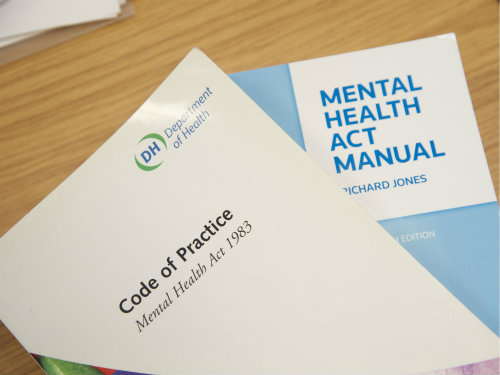
A deal struck between government, NHS providers, police and social care leaders on how services should respond to mental health emergencies will end ‘unacceptable’ variations in the quality of crisis care, ministers have claimed.
The government’s ‘mental health crisis care concordat’ has been signed by over 20 organisations including The College of Social Work and The Association of Directors of Adult Social Services. The 55-page agreement ‘challenges’ local agencies to make a series of improvements but its lack of any funding commitments to help already-stretched services raise standards has left some campaigners and social workers concerned.
Improvements demanded of local agencies in the concordat include:
- Ensuring that NHS commissioners meet their duties under section 140 of the Mental Health Act to inform local authorities about arrangements for patients who require hospital care in cases of special urgency.
- Ensuring that crisis resolution teams are available 24 hours a day, 7 days a week.
- Making sure NHS units are available 24 hours a day, 7 days a week to take people detained by police under their Mental Health Act powers.
- Agreeing response timescales locally for mental health assessments.
- The agreement also states that: “There should be no circumstances under which mental health professionals will not carry out assessments because beds are unavailable.”
Every local area is expected to have an agreed plan for making the concordat improvements by December of this year, the government said. Mental health charity Mind has been tasked with holding local agencies to account and will hold an annual summit to review progress.
The concordat’s action plan also outlines deadlines for several pieces of work the signatories say will improve crisis care. These include:
- A review of the Mental Health Act Code of Practice will be published by October 2014.
- Local authorities will review their contributions to mental health crisis services by April 2014.
- Social services and local NHS partners will have systems in place to ensure AMHP provision is sufficient by April 2014. Councils experiencing AMHP shortages should consider employing locums to boost capacity and cut assessment delays, the concordat states.
- The Department of Health and Care Quality Commission will decide whether the CQC requires additional powers to regulate AMHP services by April 2014.
The concordat comes months after investigations by Community Care highlighted severe problems with mental health crisis care that are putting patients at risk. We also revealed how funding for mental health teams has been cut in real terms, despite promises of investment.
Announcing the launch of the concordat, Care and support minister Norman Lamb said crisis care was the “most stark example” of the inequality in the NHS’s response to physical and mental health.
“The NHS and police already work well together in some areas, but it is totally unacceptable that crisis mental health care is so variable across the country. It is imperative that all areas seek to implement the principles of the Concordat as quickly as possible to ensure consistent care, no matter where you live,” said Lamb.
Ruth Allen, chair of The College of Social Work’s mental health faculty, said the concordat was an important step forward in highlighting problems with mental health crisis care.
“It’s great also to see the vital contribution of AMHPs reiterated throughout the document and we look forward to working with others in social care to support the development of AMHP services,” said Allen.
“What this document cannot address, of course, is the structural underinvestment in mental health compared to physical health – which is both historical and is now structured into the less favourable mental health tariff.”
Faye Wilson, chair of the British Association of Social Workers’ mental health network, said:
“This document has laudable aims – it’s good to have – but I really struggle to see how local services are going to deliver these changes without more resources. The reality on the ground is that services in many parts of the country are in crisis and staff are struggling.”
David Smith, joint chair of the Adass mental health network, said: “This represents an important commitment to improving services for some of our most vulnerable adults. We particularly welcome the recognition it provides of our need for properly trained and experienced social workers.
“There may be cost implications for its implementation. But nobody should underestimate our determination to eliminate small pockets of poor practice by raising the standards of care throughout our services.”
But Marjorie Wallace, chief executive of mental health charity SANE, raised concerns that a lack of funding commitments meant the “brave words” in the agreement wouldn’t be translated into practice.
“We need to hear how mental health trusts are going to be funded to enable all of them to transform the current acute shortage of beds and crisis care to meet these new, urgent requirements,” she said.
Andy McNicoll is Community Care’s community editor



 Bournemouth, Christchurch and Poole
Bournemouth, Christchurch and Poole  Hampshire County Council
Hampshire County Council  Oxfordshire County Council
Oxfordshire County Council  South Gloucestershire Council
South Gloucestershire Council  Wokingham Borough Council
Wokingham Borough Council  Webinar: building a practice framework with the influence of practitioner voice
Webinar: building a practice framework with the influence of practitioner voice  ‘They don’t have to retell their story’: building long-lasting relationships with children and young people
‘They don’t have to retell their story’: building long-lasting relationships with children and young people  Podcast: returning to social work after becoming a first-time parent
Podcast: returning to social work after becoming a first-time parent  How managers are inspiring social workers to progress in their careers
How managers are inspiring social workers to progress in their careers  Workforce Insights – showcasing a selection of the sector’s top recruiters
Workforce Insights – showcasing a selection of the sector’s top recruiters 

 Facebook
Facebook X
X LinkedIn
LinkedIn Instagram
Instagram
Comments are closed.